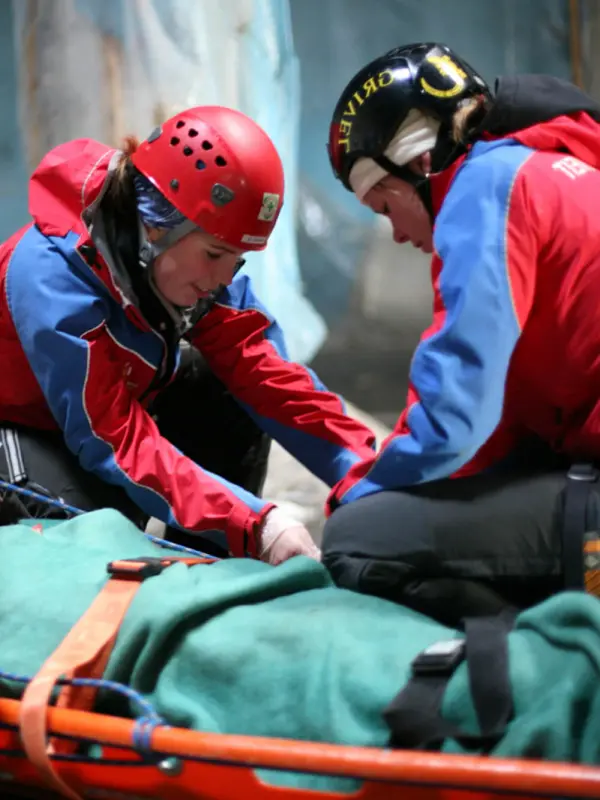Our History
For over 40 years, Wilderness Medical Associates International (“WMA”) has been teaching practical medicine to people who work in remote and difficult environments. The core curriculum is designed to provide the skills and insight needed to improvise, adapt, and exercise reasonable judgment at any level of medical training.
Although the company’s roots are in the mountains, deserts, and oceans, the training philosophy has proven effective in any setting where access to definitive care is delayed or impossible. The term wilderness context applies just as well to a city whose infrastructure has been destroyed as to a fishing boat off the coast of Alaska.
How It All Started
Wilderness Medical Associates International was born in the early 1980s when the field of wilderness and remote medicine was just emerging. Our founder, Dr. Peter Goth, saw a need to improve upon the first aid training that was being offered to Outward Bound instructors and wilderness guides. Dr. Goth also held the belief that pre-hospital practitioners can be trained to make a diagnosis and develop a plan appropriate to whatever challenges they might face.
Dr. Goth teamed up with Jeff Isaac, PA-C, Frank Hubbell, D.O. and Tom Judge to teach the first WEMT course for wilderness educators at the Hurricane Island Outward Bound School in Maine in 1984. The course proved successful, spurring Dr. Goth to establish Wilderness Medical Associates as a training company and forge ahead with adding new elements including spine assessment criteria, the treatment of anaphylaxis, advanced wound care, and other medical protocols to the curriculum.
In 1997, David “DJ” Johnson bought the company and navigated the company through a period of steady growth to the point where we now serve approximately 10,000 students per year worldwide.
An Effective Approach to Teaching and Learning
In the early days, WMA instructors focused significant amounts of energy on understanding how students learn and recall both information and skills. The result of these observations led Dr. Goth to veer from the conventional “if you see this, do this” checklist-oriented approach to teaching first aid skills. Instead, he designed a concept-based curriculum built upon effective critical thinking.
Dr. Goth and his instructional team developed a set of general principles and a patient assessment system that allow students to consistently identify the needs of a patient and provide appropriate, high quality medical care. Using these tools, students were able to demonstrate the ability to differentiate between a medical emergency and a medical problem, make good decisions about next steps, effectively assess and treat injuries, and clearly communicate information about a patient’s condition to medical professionals and identify the resources they need from others to provide patient care.
Defining a New Paradigm – Remote and Low Resource Medicine
For those who were working and playing in remote and wilderness environments in the late 1980s and 1990s, our courses proved so much more effective than conventional medical trainings that the idea of wilderness medical training began to flourish. The key was giving pre-hospital practitioners the ability to think clearly on their feet and function independently when the medical system is unavailable or disrupted. Today, wilderness medical training is offered worldwide, with many of the protocols and training procedures taught in our courses now adopted by mainstream emergency medical services.
Sharing the Knowledge: Publishing Texts
Because the field of wilderness medicine was new when WMA started, there was a need to create learning materials including textbooks, field guides, instructional materials, etc. In 1991 Jeff Isaac and Peter Goth collaborated on the Outward Bound Wilderness First Aid Handbook. At this time, Jeff Issac also took on a more prominent role as the Curriculum Director where he was instrumental in ensuring that the curriculum was accessible, effective, and could be delivered effectively by an expanding pool of talented WMA instructors. Together with his co-author David “DJ” Johson, M.D., Jeff has written two additional WMA textbooks.
An International Reach
WMA’s first foray into teaching outside of the United States began when an individual from Icelandic Search and Rescue (“ICE-SAR”) became interested in the curriculum, eventually taking a WEMT course in Maine in 1999. Soon after the course, David “DJ” Johnson traveled to Iceland with several other WMA instructors to train ICE-SAR to deliver WMA curriculum locally.
Every additional effort to expand globally has been unique, i.e., Asia, Brazil, Canada, Europe, Iceland, Japan, Taiwan, but each has allowed individuals from other countries to take a WMA course and to be trained to instruct as WMA instructors in their home countries. To reflect this growth, WMA rebranded itself in 2010 to “Wilderness Medical Associates International.”
Recent Changes
After 23 years at the helm of WMA, David “DJ” Johnson sold the company to Abby Rowe, a WMA lead instructor, in November of 2020. Under Abby’s leadership and with the expert guidance of Will Smith, M.D., our Medical Director, and Julie Anderson, RN, CFRN, NRP, WEMS, our Curriculum Director, we continue to focus on improving the quality of our curriculum, the professionalism and teaching ability of our talented instructors, and the company’s keen focus on providing both our students and our instructors with excellent support.
One Final Note
We do not deviate from the mainstream arbitrarily, but we are not afraid to do so. Our curriculum is constantly evolving based on careful analysis of the available science and considerable clinical experience measured against the reality of providing medical care in difficult and dangerous places. We make no attempt to change mainstream medicine, but to provide helpful guidance to those working well outside of it.
